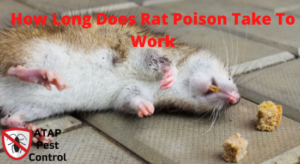Depending on the ingredients used in the formulation, rat poisons operate via a variety of mechanisms. The speed with which the poison works is determined by the type of poison used and the time it takes for the rats to accept the bait as a viable food source. Under ideal conditions, the poison can begin killing rats in as little as one day. However, you should expect the process to take between four days and one week to completely eradicate the population. The confusion is how many rats are in Chicago? How to kill them?

How Long Does It Take Rat Poison to Kill a Rat? What is the Mechanism Of the Poison?
Rat poisons kill rats in five different ways, and the speed with which they work varies.
- Internal Bleeding Death (3 to 7 days)
- Heart Attack Caused Death (3 to 4 days)
- Lung Failure Caused Death (12 hours to 2 days)
- Death As a Result of Central Nervous System Failure (14 hours to 4 days)
- Dehydration-Related Death (3 to 5 days)
Internal Sufficiency
These are the most common poisons, and they are extremely effective at killing rats. These toxins are essentially blood thinners (anticoagulants), which disrupt Vitamin K levels and prevent clotting. After ingesting a lethal dose, the internal bleeding takes 3 to 4 days to kill the rodent. How long does rat poison take to work?
In this class, there are two poison families: Generation 1 and Generation 2.
Generation 1 poisons (warfarin, chlorophacinone, diphacinone) work best when the toxic dose is gradually increased over 2 to 3 feeding nights. This means that it could take up to three nights for enough poison to be ingested, followed by four days for the poison to kill the rat. This gives you a total of seven days to kill.
Generation 2 poisons (brodifacoum, bromadiolone, difenacoum, difethialone) can accumulate a toxic dose in a single night of feeding, implying a four-day total kill time.
The Heart Attack
Only one rat poison, cholecalciferol, falls into this category. Cholecalciferol is a vitamin D3 derivative. Although it may appear strange that a vitamin could kill a rat, the drug actually raises the calcium level in the blood to the point where rats have a heart attack!
A rat can consume a lethal dose of this poison in a single feeding and die 3-4 days later. An interesting note about this poison is that, unlike most of the other poisons on this list, none of the dogs got sick in a controlled study where they were fed a diet of rats poisoned by this poison.
Failure of the Lungs
There are several poisons in this category, but zinc phosphide is the ONLY one you should ever use. Zinc phosphide is not a particularly toxic substance in and of itself. However, when the compound comes into contact with the acid in a rat’s stomach, it degrades and emits a HIGHLY toxic gas known as phosphine.
Phosphine degrades the cells in the rat’s body. The gas is not specific in how it destroys the rat’s internal organs, but the rats usually die from pulmonary edema, which occurs when the lungs begin to break down. The rate at which this poison kills rats is determined by how much was consumed as well as what else was in the rat’s stomach. The stomach acid decomposes the bait, which is an important step. Death usually occurs within 12 to 24 hours.
Failure of the Central Nervous System
There is only one poison in this category: bromethalin.
Bromethalin kills rats through a complicated mechanism. In a nutshell, bromethalin disrupts the rat’s ATP cycle, rendering it unable to provide energy to its body. Bromethalin is a single-dose poison that can kill between 14 and four days after administration.
Dehydration
RatX, a relatively new product on the market, is effective at killing rats but is not technically a poison. RatX’s active ingredients are corn gluten and salt. When the rat consumes the bait, the corn gluten swells inside the rat’s stomach and prevents the rat from absorbing water. The salt facilitates the process. Dehydration will kill the rat in three to four days. RatX’s creators claim that the bait is so effective at dehydrating the rat that the decomposing body emits no odors.
Why Not Use the Poison With the Shortest Half-Life?
Because some poisons kill rats faster than others, you may be wondering why everyone doesn’t use the poison that kills rats the fastest. The main reason is that in order for the poison to work, the rat must first consume it. This means that being able to formulate the poison into a pellet or block that a rat will want to eat is critical. The pest control industry has had the most success with palatable baits containing anticoagulant poisons. A secondary reason is for your own safety. Second-generation anticoagulants are more effective than first-generation anticoagulants, but they are extremely toxic, posing a serious risk of secondary poisoning. Secondary poisoning occurs when a rat dies as a result of the poison and your dog consumes the dead rat. There is still enough poison in the rat to poison your dog.
Second Generation poisons are only packaged for sale to the commercial pest control market and not to retail consumers due to the increased risks associated with them.
Is Rat Poison or Rat Baits the Best Solution for Your Problem?
Poisons are always the best solution for rat infestations. For one thing, the length of time it takes for rat poison to work is determined by the type of rat poison used. If you only have a few rats to deal with, trapping is a much faster way to solve the problem. Many people prefer to use poison instead of traps because those massive snap traps for rats can be frightening and dangerous. They also don’t want to be responsible for cleaning up the bloody mess that occurs after the rat is apprehended.
A rat zapper is an electrocution trap for rats. A rat zapper has the advantage of killing rats instantly (no suffering), and there is no real mess to clean up. Simply take the rat zapper (with the dead rat inside) to the trash and let the corpse fall out of the trap.
Another situation in which poison is not recommended is if you have rats in your attic. Yes, the poison will kill attic rats, but you will then have an attic full of decomposing rat corpses. The smell will be….rememberable. Obviously, you don’t want to use any poisons if pets or children will have access to them. If pets or children are present, a Tier 1 Bait Station is the best way to use poisons.
Finally, the use of poisons will be ineffective in situations where the rats already have a plentiful supply of food to feed on. If you have open garbage cans, bowls of dog food, or sacks of chicken feed lying around, the rats will eat that instead of your baits.
ATAP Exterminators are famous for rat and mice control near me. Most people prefer to kill roof rats by themselves but it can take along. For this, you can get our services and call us for more information at (773)701-7705.
